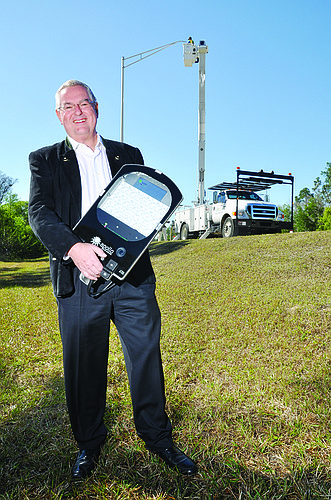- November 24, 2024
-
-
Loading

Loading

The idea of an entire city connected to the Internet is getting closer to reality, and one Naples startup is on the leading edge of the trend.
German-born engineer Uli Altvater has developed an ingenious street light with room inside the light casing for a computer that connects anyone nearby to the Internet. Customers include municipalities and utilities. “We can do citywide Wi-Fi with street lights,” Altvater says.
Apollo recently got a boost when it announced a partnership with California-based Trilliant, which already provides communication networks for utilities that serve a combined 85 million customers. “We resell each other's products,” says Altvater. “It basically gives us market access.”
Utilities benefit from citywide Wi-Fi because they could read water and electric meters without sending drivers around to read them. Already, many utilities have installed smart meters on homes and businesses that don't require a driver to get out of his vehicle to read the meter.
“What we see in the wireless industry is more and more devices are connected to the Internet,” says Altvater, the CEO and co-owner of Apollo with wife, Monika Altvater, and Detroit investor Farid Shoukani.
Altvater is no newcomer to wireless technology. He helped create the first wireless Internet system for the German military and worked for IBM in Germany before creating his own wireless company. Homeowners in Naples since 1980, Uli and Monika moved to Southwest Florida permanently in 1996.
Apollo manufactures streetlights powered by energy-saving light-emitting diodes. Each light casing has room for a computer that acts like a cell-phone tower, connecting anyone standing or driving nearby with a smart device to the Internet. “My vision is to have an Android computer in every light,” Altvater says.
Already, a pilot program on Rattlesnake Hammock Road and Santa Barbara Boulevard in Collier County is showing success. Each light can be controlled individually and remotely by computer or even by cell phone. When a Naples resident recently complained about a bright streetlight shining into his bedroom, for example, Altvater lowered the light's strength remotely.
The computer and sensors inside the streetlight can also tell if there's no traffic so that the lights can dim and conserve energy late at night, boosting back to full power when a car or pedestrian comes through. This feature is already producing electricity savings of 65% or more, which helps municipalities like Collier County pay for the lights that list for $850 in about three years.
Each streetlight has room for a small but powerful camera that could detect someone driving the wrong way and can immediately alert law enforcement. A fully equipped light with a camera costs $2,500 because it's a sophisticated system. “It's a full-blown computer,” Altvater says.
A German supplier to the auto industry makes the light's rugged casings, which are waterproof. Altvater tested that himself: “I threw it in my pool,” he laughs.
The software took two years to create, and it has safety features that encrypt data. “I'm a little paranoid,” Altvater smiles.
So far, Altvater estimates he and his partner have invested $500,000. “There's a lot of sweat equity because we've taken no paycheck,” Altvater says.
Altvater says he can build 1,000 lights per month in the manufacturing facility he operates on Horseshoe Drive in Naples. But if any of the dozen bids Apollo has submitted comes through, the company has lined up a contract manufacturer in Safety Harbor to handle as many as 5,000 a month.
Altvater says he's seeking additional investors for the capital investment to manufacture the lights when a large contract comes through. “Government customers don't pay fast,” Altvater says. “We have to have financing for 90 to 120 days.”
Follow Jean Gruss on Twitter @JeanGruss